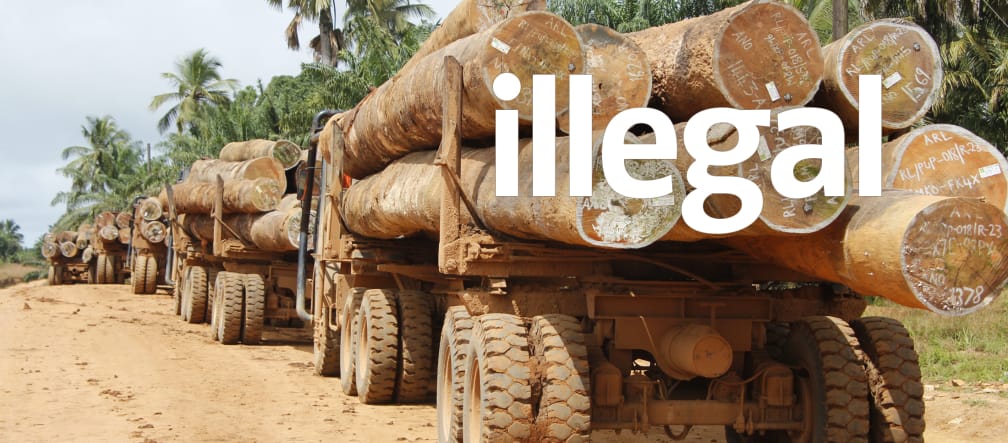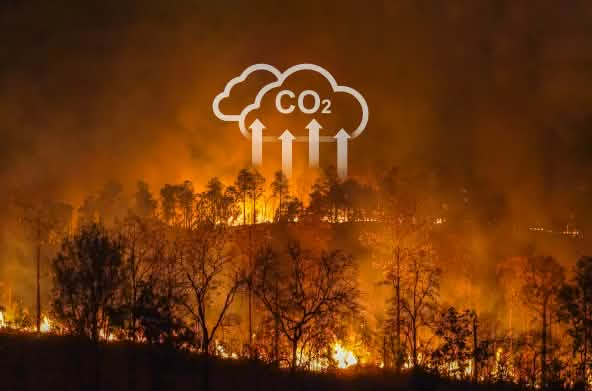
Beendete Petition
Kein illegales Holz in die EU!
Die EU schließt mit Liberia einen Vertrag über den Holzimport. Dabei warnen Umweltschützer, dass alle bestehenden Rodungskonzessionen illegal sind. Der artenreiche Upper Guinean Rainforest ist bedroht. Die EU darf nicht zulassen, dass illegal geschlagenes Holz importiert wird. Bitte unterstützen Sie die Forderung mit Ihrer Unterschrift.
An: Entwicklungs-Kommissarin Jutta Urpilainen, Regierungen der EU-Mitgliedstaaten
„Alle bestehenden großen Holzkonzessionen in Liberia sind illegal. Die EU darf nicht zulassen, dass illegal geschlagenes Holz importiert wird.“Liberia beherbergt einen einmaligen Naturschatz: vom Aussterben bedrohte Westafrikanische Schimpansen. In dem kleinen Land wächst mehr als ein Drittel des Upper Guinean Rainforest. Der Artenreichtum ist überwältigend.
Die Regierung des bitterarmen Landes setzt nach einem Bürgerkrieg und der Ebolakrise auf den Holzexport, um die Armut zu bekämpfen. Es droht dadurch jedoch die ungezügelte Plünderung der Regenwälder. Laut der Studie „Hold the Line“ der Organisation Global Witness sind alle großen Holzkonzessionen Liberias illegal.
Manche Holzfirmen verschleiern demnach, wer Nutznießer der Gewinne ist. Darunter scheinen verbotenerweise auch einflussreiche Politiker zu sein. Auch hinter Konzessionen, die eigentlich Dorfgemeinschaften zugutekommen sollen, können in Wirklichkeit Holzfirmen stecken. Außerdem manipulieren Firmen im großen Stil Angaben über ihren wahren Holzeinschlag. Schließlich hinterziehen sie dem klammen Staat viele Millionen Euro Steuern.
„Logging-Firmen lügen, betrügen und stehlen vom liberianischen Volk“, sagt Jonathan Grant von Global Witness.
Derzeit verhandelt die EU mit Liberia über ein Holzhandelsabkommen: Im Rahmen eines Voluntary Partnership Agreements (VPA) würde die EU Holz ohne weitere Prüfung importieren, wenn Liberia die Legalität garantiert. Es bestehen große Zweifel, dass dies funktioniert. Vielmehr ist zu befürchten, dass illegale Konzessionen auf dem Papier für legal erklärt werden und Holz aus Raubbau zu uns gelangt.
Trotz dieser Gefahr könne das System zum Schutz von Wäldern beitragen, berichten liberianische Umweltschützer. Ihre Arbeit sei durch die VPA-Verhandlungen gestärkt worden. Jetzt kämpfen sie dafür, dass alle illegalen Konzessionen zurückgenommen werden.
Bitte fordern Sie von der EU, kein Holz von Liberias illegalen Konzessionen zu importieren.
Global Witness hat diese Pressemitteilung zu ihrer Studie „Hold the Line“ veröffentlicht:
Logging companies have lied, cheated, and stolen from the Liberian people and must be held accountable.
A new Global Witness exposé reveals how Liberian logging companies are illegally hiding their true owners, among them powerful politicians who are profiting from contracts that cover huge swathes of forest.
The report, Hold the Line, describes how all of Liberia’s large logging contracts are fundamentally illegal, having violated multiple laws including a ban on politicians owning companies with logging contracts. Some of these violations date back nearly a decade to when the contracts were issued.
If the Liberian government and its international partners are to turn the page on the country’s history of corruption and conflict timber they must hold accountable politicians and loggers who are exploiting Liberia’s forests and people.
Logging companies have lied, cheated, and stolen
“Logging companies have lied, cheated, and stolen from the Liberian people and must be held accountable,” said Jonathan Gant with Global Witness. “Rather than helping Liberia rebuild after its war and the recent Ebola epidemic, almost all of Liberia’s loggers are failing to pay their taxes – essentially stealing from the Liberian people.”
Global Witness’ investigations into Liberia’s logging companies found that:
Companies are hiding their owners. In an effort to root out corrupt deals, the Liberian government requires logging companies to declare their real, or “beneficial,” owners. However, in 2015 when the government demanded this information, the companies behind half of Liberia’s logging contracts ignored the demand: five failed to provide the government with any information, while one company filed incorrect data, hiding that it is actually owned by powerful politicians.
Companies are failing to pay their taxes, currently owing an immense US$ 25 million to the cash-strapped Liberian government, which if paid would amount to nearly five percent of Liberia’s entire budget.
Companies have illegally-manipulated their logging data on a massive scale, concealing how many trees they are actually felling. (1)
Companies are co-opting community forest licenses – government permits designed help rural people manage their forests. Evidence shows that five large community licenses have been awarded illegally, with companies encouraging people who do not represent communities to obtain licenses for large forests without first doing necessary mapping and socio-economic surveys. (2)
Liberia is home to 40 percent of West Africa’s best remaining forest, the Upper Guinean Rainforest. During Liberia’s civil war, which ended in 2003, logging companies propped up the regime of Charles Taylor and trafficked arms.
Following the war, Liberia and its partners – including the EU, Norway, the US, and the Extractive Industries Transparency Initiative – worked to reform the sector. These reforms have resulted in both better laws and increased government capacity, but also in new logging licenses covering ten percent of the country.
“Liberia’s forest reform programmes have been good for the country and should be supported,” said Gant. “But the Liberian government and international donors must also face up to the fact that big logging companies are corrupting Liberia in a way which threatens to unravel progress on the country’s hard-fought gains.”
Hold the Line also describes how Liberia and its partners can confront illegal logging companies and ensure that their reform programs work. Key among these recommendations are:
The EU, which has signed a treaty with Liberia promoting trade in legal timber called a Voluntary Partnership Agreement, should make clear it will not allow timber from Liberia’s current large contracts into Europe.
Norway, which has signed a US$ 150 million deal with Liberia promoting community forestry and conservation, should ensure Liberia investigates and cancels illegal contracts as the country promised in the deal.
The Liberian Extractive Industries Transparency Initiative, which requires natural resource companies to declare their real, or “beneficial,” owners should penalize companies that have failed to report or reported incorrect ownership information.
Notes
(1) The Liberian government has denied that companies have manipulated data, although investigations conducted by the company tracking Liberian timber – SGS – concluded that loggers were doing so.
(2) The government has denied that any community forest licenses have been awarded illegally.
An: Entwicklungs-Kommissarin Jutta Urpilainen, Regierungen der EU-Mitgliedstaaten
Sehr geehrte Jutta Urpilainen,
sehr geehrte Damen und Herren,
Liberia beheimatet 40 Prozent des äußerst artenreichen Upper Guinean Rainforest, der auch den vom Aussterben bedrohten Westafrikanischen Schimpansen einen Lebensraum bietet.
Die EU verhandelt derzeit im Rahmen des FLEGT Action Plan die Umsetzung des Voluntary Partnership Agreements (VPA) mit dem westafrikanischen Land. Es gibt allerdings Grund zur Besorgnis.
Die Studie „Hold the Line“ der Organisation Global Witness belegt, dass alle großen Holz-Konzessionen in Liberia illegal sind. Dem Report zufolge:
- verschleiern Firmen, wer von den Gewinnen profitiert. Augenscheinlich sind auch mächtige Politiker darunter.
- hinterziehen Firmen Steuern. Es geht um 25 Millionen Dollar, was fast 5 Prozent des liberianischen Staatshaushalts entspricht.
- manipulieren Firmen im großen Stil Daten über ihren Holzeinschlag.
- unterwandern Firmen Community Forestry Management Agreements, von denen eigentlich arme Dorfgemeinschaften profitieren sollen.
Im Rahmen eines Voluntary Partnership Agreements (VPA) würde die EU Holz ohne weitere Prüfung importieren, wenn Liberia die Legalität garantiert. Es bestehen vor dem Hintergrund der Global-Witness-Studie größte Zweifel, dass dies funktioniert. Vielmehr ist zu befürchten, dass illegale Konzessionen auf dem Papier für legal erklärt werden und Holz aus Raubbau zu uns gelangt.
Die EU muss daher sicherstellen, dass kein Holz von Liberias illegalen Konzessionen importiert wird. Die EU muss Liberia zudem dabei unterstützen, illegale Konzessionen zu ermitteln und aufzuheben.
Mit freundlichen Grüßen

